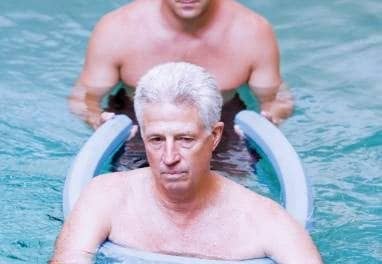February 20, 2008
Tucson, AZ — Climbing Africa’s highest mountain, Mount Kilimanjaro, would challenge even the fittest individuals. For 32-year-old Canadian, Matthew Brewer, who has cerebral palsy that affects his legs, every step on uneven ground is difficult, and the challenge of an 8-day hike over rugged terrain stretching taller than 13 stacked Empire State buildings was not an easy one.
Undaunted, Brewer pledged with Wayne Tom, 41, to conquer the mountain. Both men receive services at Prince George Association for Community Living (AiMHi) in Prince George, British Columbia. The two teamed with AiMHi program managers Marc Lawrence, 30, and Heather Groleau, 22, to scale the mountain.
The journey to Mount Kilimanjaro, in northeast Tanzania near the Kenya border, was sponsored by the British Columbia Association for Community Living to raise awareness about the capabilities of persons with disabilities. The journey brought together 45 persons who receive services and their supporters from 16 of the province’s community living programs.
“The team demonstrated how much can be accomplished by sharing the same goals and desires,” Lawrence said. “Collectively, we believed we could and would climb the mountain.”
Team members hiked through several terrains and climate zones—forest, moorland, high desert, and glaciers. Of the persons embarking on the journey, 40, including one person using a wheelchair, reached Stella Point, 19,012 feet above sea level. Thirty team members pressed on to reach Kilimanjaro’s highest point, Uhuru Peak, 19,340 feet above sea level.
Brewer walked every step of the climb, including the ascent to Uhuru Peak. “Coming down was the hardest,” he said. “It was rocky at the top but grew easier nearer the bottom.”
“The journey was a test of determination,” Lawrence added. “The climbers individually pushed their personal endurance levels to unimaginable heights, sometimes hiking 10 to 12 hours a day over rugged terrain. We faced heat, exhaustion, bitter cold, challenging ridges, and altitudes with only half as much oxygen as our bodies were accustomed to. Altitude sickness became our greatest challenge.
“It took lots of mutual support to keep our spirits up. Often, it would be the person I was there to support who gave me the strength to go on.”
In addition to challenges, the climb brought unexpected moments of delight. “When I came into camp on the third day, 220 porters and guides gathered around me and sang in Swahili,” Brewer said. “It was awesome.”
Lawrence and Brewer will recount the challenges of their mountaineering experience on Monday, March 17. Their presentation is part of the CARF’s Employment and Community Services “Aspire to Innovation and Excellence” International Conference highlighting exemplary practices in the disability field March 16–18 at the Tucson Marriott University Park Hotel.
Lawrence is AiMHi’s human resources coordinator at present. Aided by AiMHi’s work option and community support team, Brewer lives on his own and has started a business with a friend shoveling snow in the winter and mowing grass in the summer. He included the climb in his person-centered plan and says he was proud to check it off his list of things to accomplish.
A conference brochure and online registration are at the Employment and Community Services seminars link at www.carf.org/events.
Source: CARF




